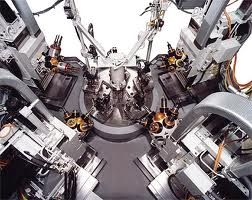Neumática e Hidraúlica

Pneumatics is a branch of technology, which deals with the study and application of use of pressurized gas to affect mechanical motion. Pneumatic systems are extensively used in industry, where factories are commonly plumbed with compressed air or other compressed inert gases. This is because a centrally-located and electrically-powered compressor that powers cylinders and other pneumatic devices through solenoid valves is often able to provide motive power in a cheaper, safer, more flexible, and more reliable way than a large number of electric motors and actuators. Pneumatics also has applications in dentistry, construction, mining, and other areas.
Hydraulics is a topic in applied science and engineering dealing with the mechanical properties of liquids. Fluid mechanics provides the theoretical foundation for hydraulics, which focuses on the engineering uses of fluid properties. In fluid power, hydraulics is used for the generation, control, and transmission of power by the use of pressurized liquids. Hydraulic topics range through most science and engineering disciplines, and cover concepts such as pipe flow, dam design, fluidics and fluid control circuitry, pumps, turbines, hydropower, computational fluid dynamics, flow measurement, river channel behavior and erosion.
Temario a Impartir
- Características de un circuito eléctrico.
- Leyes de los gases perfectos.
- Producción y tratamiento del aire comprimido.
- Regulación y control.
- Cilindros neumáticos.
- Esquemas de circuitos neumáticos.
Actividades obligatorias
- Ejercicios de circuitos.
- Resumenes de Documentales recomendados.